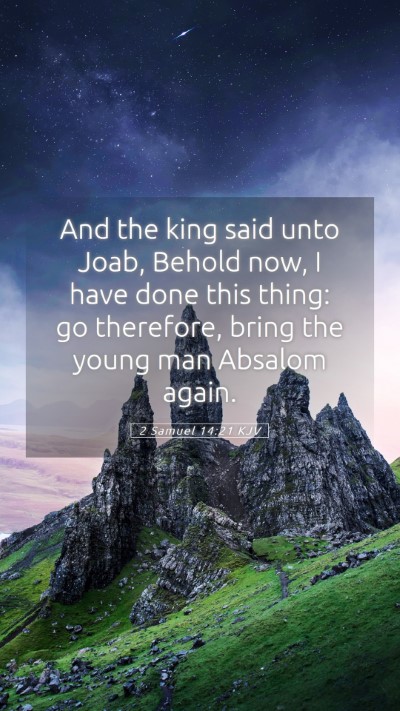Old Testament
Genesis Exodus Leviticus Numbers Deuteronomy Joshua Judges Ruth 1 Samuel 2 Samuel 1 Kings 2 Kings 1 Chronicles 2 Chronicles Ezra Nehemiah Esther Job Psalms Proverbs Ecclesiastes Song of Solomon Isaiah Jeremiah Lamentations Ezekiel Daniel Hosea Joel Amos Obadiah Jonah Micah Nahum Habakkuk Zephaniah Haggai Zechariah MalachiVerse
2 Samuel 14:1 2 Samuel 14:2 2 Samuel 14:3 2 Samuel 14:4 2 Samuel 14:5 2 Samuel 14:6 2 Samuel 14:7 2 Samuel 14:8 2 Samuel 14:9 2 Samuel 14:10 2 Samuel 14:11 2 Samuel 14:12 2 Samuel 14:13 2 Samuel 14:14 2 Samuel 14:15 2 Samuel 14:16 2 Samuel 14:17 2 Samuel 14:18 2 Samuel 14:19 2 Samuel 14:20 2 Samuel 14:21 2 Samuel 14:22 2 Samuel 14:23 2 Samuel 14:24 2 Samuel 14:25 2 Samuel 14:26 2 Samuel 14:27 2 Samuel 14:28 2 Samuel 14:29 2 Samuel 14:30 2 Samuel 14:31 2 Samuel 14:32 2 Samuel 14:33


Commentary on 2 Samuel 14:21
Verse Context: In this passage, King David is addressing Joab regarding the restoration of Absalom, his son. Joab had taken initiative to speak on behalf of Absalom, who had been estranged from David due to a prior conflict. This verse highlights the king’s acknowledgment of Joab's actions and his intentions regarding the familial conflict.
Summary of Biblical Meaning
Understanding Scripture: 2 Samuel 14:21 reads: “And the king said unto Joab, Behold now, I have done this thing: go therefore, bring the young man Absalom.” This verse emphasizes King David's willingness to reconcile with Absalom after a period of estrangement. David's words reflect a decisive moment in the narrative, where forgiveness is embraced, marking a critical juncture in the lives of the characters involved.
Insights from Commentaries
Spiritual Applications and Reflections
Personal Reflection: The message derived from this verse resonates with the importance of reconciliation in our own lives. Just as David sought to mend his relationship with Absalom, individuals are encouraged to pursue forgiveness and restoration with others, symbolizing divine grace and love.
Applying Bible Verses to Daily Life: Readers can apply the truths found in 2 Samuel 14:21 by reflecting on their relationships and considering areas where healing is needed. This can inspire believers to actively engage in the process of reconciliation in their personal lives, following the biblical examples of restoring broken bonds.
Cross References
Study Insights
Bible Study Tools: Engaging with commentaries like those by Henry and Clarke enriches Bible study groups or personal online Bible study sessions. These tools provide profound insights and various interpretations, enhancing understanding of difficult Bible passages like this one.
Conclusion: In summary, 2 Samuel 14:21 serves as a poignant reminder of the power of forgiveness and the importance of familial relationships, set against the backdrop of historical and cultural complexities that defined ancient leadership. Engaging in biblical exegesis of such verses fosters a deeper understanding of Scripture, guiding individuals in their faith journeys.